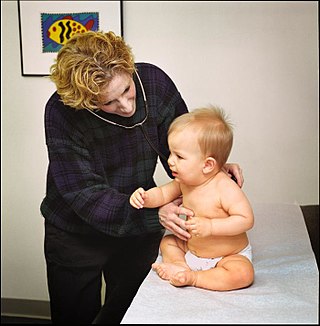Related Research Articles

A general practitioner (GP) or family physician is a doctor who is a consultant in general practice.

General practice is personal, family, and community-orientated comprehensive primary care that includes diagnosis, continues over time and is anticipatory as well as responsive.

Family medicine is a medical specialty within primary care that provides continuing and comprehensive health care for the individual and family across all ages, genders, diseases, and parts of the body. The specialist, who is usually a primary care physician, is named a family physician. It is often referred to as general practice and a practitioner as a general practitioner. Historically, their role was once performed by any doctor with qualifications from a medical school and who works in the community. However, since the 1950s, family medicine / general practice has become a specialty in its own right, with specific training requirements tailored to each country. The names of the specialty emphasize its holistic nature and/or its roots in the family. It is based on knowledge of the patient in the context of the family and the community, focusing on disease prevention and health promotion. According to the World Organization of Family Doctors (WONCA), the aim of family medicine is "promoting personal, comprehensive and continuing care for the individual in the context of the family and the community". The issues of values underlying this practice are usually known as primary care ethics.
Polyclinics in England were intended to offer a greater range of services than were offered by current general practitioner (GP) practices and local health centres. In addition to traditional GP services they would offer extended urgent care, healthy living services, community mental health services and social care, whilst being more accessible and less medicalised than hospitals. A variety of models were proposed, ranging from networks of existing clinics to larger premises with several colocated general practitioner (GP) practices, more extensive facilities and additional services provided by allied healthcare professionals.
General medical services (GMS) is the range of healthcare that is provided by general practitioners as part of the National Health Service in the United Kingdom. The NHS specifies what GPs, as independent contractors, are expected to do and provides funding for this work through arrangements known as the General Medical Services Contract. Today, the GMS contract is a UK-wide arrangement with minor differences negotiated by each of the four UK health departments. In 2013 60% of practices had a GMS contract as their principal contract. The contract has sub-sections and not all are compulsory. The other forms of contract are the Personal Medical Services or Alternative Provider Medical Services contracts. They are designed to encourage practices to offer services over and above the standard contract. Alternative Provider Medical Services contracts, unlike the other contracts, can be awarded to anyone, not just GPs, don't specify standard essential services, and are time limited. A new contract is issued each year.
Health and Social Care is the publicly funded healthcare system in Northern Ireland. Although having been created separately to the National Health Service (NHS), it is nonetheless considered a part of the overall national health service in the United Kingdom. The Northern Ireland Executive through its Department of Health is responsible for its funding, while the Public Health Agency is the executive agency responsible for the provision of public health and social care services across Northern Ireland. It is free of charge to all citizens of Northern Ireland and the rest of the United Kingdom.

The National Health Service (NHS) is the publicly funded healthcare system in England, and one of the four National Health Service systems in the United Kingdom. It is the second largest single-payer healthcare system in the world after the Brazilian Sistema Único de Saúde. Primarily funded by the government from general taxation, and overseen by the Department of Health and Social Care, the NHS provides healthcare to all legal English residents and residents from other regions of the UK, with most services free at the point of use for most people. The NHS also conducts research through the National Institute for Health and Care Research (NIHR).
SystmOne is a centrally hosted clinical computer system developed by Horsforth-based The Phoenix Partnership (TPP). It is used by healthcare professionals in the UK predominantly in primary care. The system is being deployed as one of the accredited systems in the government's programme of modernising IT in the NHS.

Michael David Dixon, (Hon) is an English general practitioner and current Head of the Royal Medical Household. He is Chair of The College of Medicine and Integrated Health and Visiting Professor at the University of Westminster.
A Summary Care Record (SCR) is an electronic patient record, a summary of National Health Service patient data held on a central database covering England, part of the NHS National Programme for IT. The purpose of the database is to make patient data readily available anywhere that the patient seeks treatment, for example if they are staying away from their home town or if they are unable to give information for themselves. Despite opposition from some quarters, by September 2010, 424 GP practices across at least 36 primary care trusts had uploaded 2.7 million Summary Care Records. On 10 October 2010, the Health Secretary announced that the coalition government would continue with the introduction, but that the records would 'hold only the essential medical information needed in an emergency – that is medication, allergen and [drug] reactions'. By March 2013, more than 24 million SCRs had been created across England.

Belgium has a universal healthcare system. Healthcare in Belgium is composed of three parts. Firstly, there is a primarily publicly funded healthcare and social security service run by the federal government, which organises and regulates healthcare; independent private/public practitioners, university/semi-private hospitals and care institutions. There are a few private hospitals. Secondly is the insurance coverage provided for patients. Finally, industry coverage; which covers the production and distribution of healthcare products for research and development. The primary aspect of this research is done in universities and hospitals.

Clinical commissioning groups (CCGs) were National Health Service (NHS) organisations set up by the Health and Social Care Act 2012 to replace strategic health authorities and primary care trusts to organise the delivery of NHS services in each of their local areas in England. On 1 July 2022, they were abolished and replaced by integrated care systems as a result of the Health and Care Act 2022.
Out-of-hours services are the arrangements to provide access to healthcare at times when General Practitioner surgeries are closed; in the United Kingdom this is normally between 6.30pm and 8am, at weekends, at Bank Holidays and sometimes if the practice is closed for educational sessions.
Patient record access in the United Kingdom has developed most fully in respect of the GP record, because computerisation in that field is almost universal. British hospitals were slower to move into electronic records. From 1 April 2015 all GP practices in England have to provide online services to patients, including access to summary electronic medical records.
EMIS Health, formerly known as Egton Medical Information Systems, supplies electronic patient record systems and software used in primary care, acute care and community pharmacy in the United Kingdom. The company is based in Leeds. It claims that more than half of GP practices across the UK use EMIS Health software and holds number one or two market positions in its main markets. In June 2022 the company was acquired by Bordeaux UK Holdings II Limited, an affiliate of UnitedHealth's Optum business for a 49% premium on EMIS's closing share price.
Patient Online is an NHS England programme to encourage GPs deliver the British government’s promise to give patients in England access to their GP records and to let them book appointments and order prescriptions online.
GP Federations became popular among English general practitioners after 2010 as a means to exploit the opportunities—or mitigate the threats—posed by the Five Year Forward View proposals in the English NHS which envisaged delivering primary care at a larger scale than the traditional GP list. It is widely believed that ‘Practices cannot survive on their own – they have to look at ways of making themselves stronger.’ 15 sites were selected in December 2015 to test new enhanced primary care models serving populations of 30,000 to 50,000 patients. Some, but by no means all, clinical commissioning groups have given financial support to encourage the formation of federations.
In 2005 the National Health Service (NHS) in the United Kingdom began deployment of electronic health record systems in NHS Trusts. The goal was to have all patients with a centralized electronic health record by 2010. Lorenzo patient record systems were adopted in a number of NHS trusts. While many hospitals acquired electronic patient records systems in this process, there was no national healthcare information exchange. Ultimately, the program was dismantled after a cost to the UK taxpayer was over $24 billion, and is considered one of the most expensive healthcare IT failures.
Livi is a digital healthcare service by Kry International AB, a Swedish online healthcare company based in Stockholm. Kry International was established in 2015 and operates as Kry in Norway and Sweden. In France and the United Kingdom, it operates as Livi.
The General Practice Data for Planning and Research system was set up by the British National Health Service as a replacement for the General Practice Extraction Service as a means of transmitting data intended for use beyond that of providing individual health care. This might include healthcare planning, or research.
References
- ↑ Shelley, Matthew (13 March 2015). "Paperless NHS supplement: Technology – instant access". Health Service Journal . Retrieved 26 April 2015.
- ↑ "Q&A: patient access pioneer Dr Amir Hannan". Health Service Journal. 28 November 2013. Retrieved 26 April 2015.
- ↑ "Increasing access to patient records". Nursing Times . 30 August 2013. Retrieved 26 April 2015.
- ↑ "Web records prove hit with patients". BBC News . 5 February 2007. Retrieved 26 April 2015.
- ↑ "Failure to join up medical records is a 'health risk', says GP chief inspector". The Independent . 2 September 2014. Archived from the original on 6 September 2014. Retrieved 30 November 2014.
- ↑ "Rising Stars: Inspiring campaign promises self care". Health Service Journal. 13 May 2015. Retrieved 14 June 2015.
- ↑ "GPs call for Truss to focus on poverty 'crisis' and invest in practices". Pulse. 7 September 2022. Retrieved 8 November 2022.
- ↑ Hannan, Amir. "BACK TO SCHOOL FOR DOCTORS, NURSES AND PATIENTS". Amir Hannan's Blog. Retrieved 12 December 2014.
- ↑ Gladwin, Jacqui (30 August 2013). "Increasing access to patient records". Nursing Times. Retrieved 26 April 2015.
- ↑ "Realising the potential of primary care". Kings Fund. 25 September 2014. Retrieved 26 April 2015.
- ↑ "Patient Access to Medical Records". Public Sphere Project. 2008. Retrieved 1 November 2015.
- ↑ "Giving patients online records access 'cuts appointment demand by 12%'". Pulse . 3 April 2013. Retrieved 26 April 2015.
- ↑ "'Pull the plug' on Summary Care Records, says GPC IT lead". Pulse. 14 February 2013. Retrieved 26 April 2015.
- ↑ "Dr Amir Hannan: 'This goes to the very heart of the doctor-patient relationship'". Pulse. 28 January 2014. Retrieved 26 April 2015.
- ↑ "HSJ Clinical Leaders 2015". Health Service Journal. 6 July 2015. Retrieved 27 August 2015.
- ↑ "Awards for New Year Honours List 2021" (PDF). Publishing Service. Retrieved 3 May 2023.